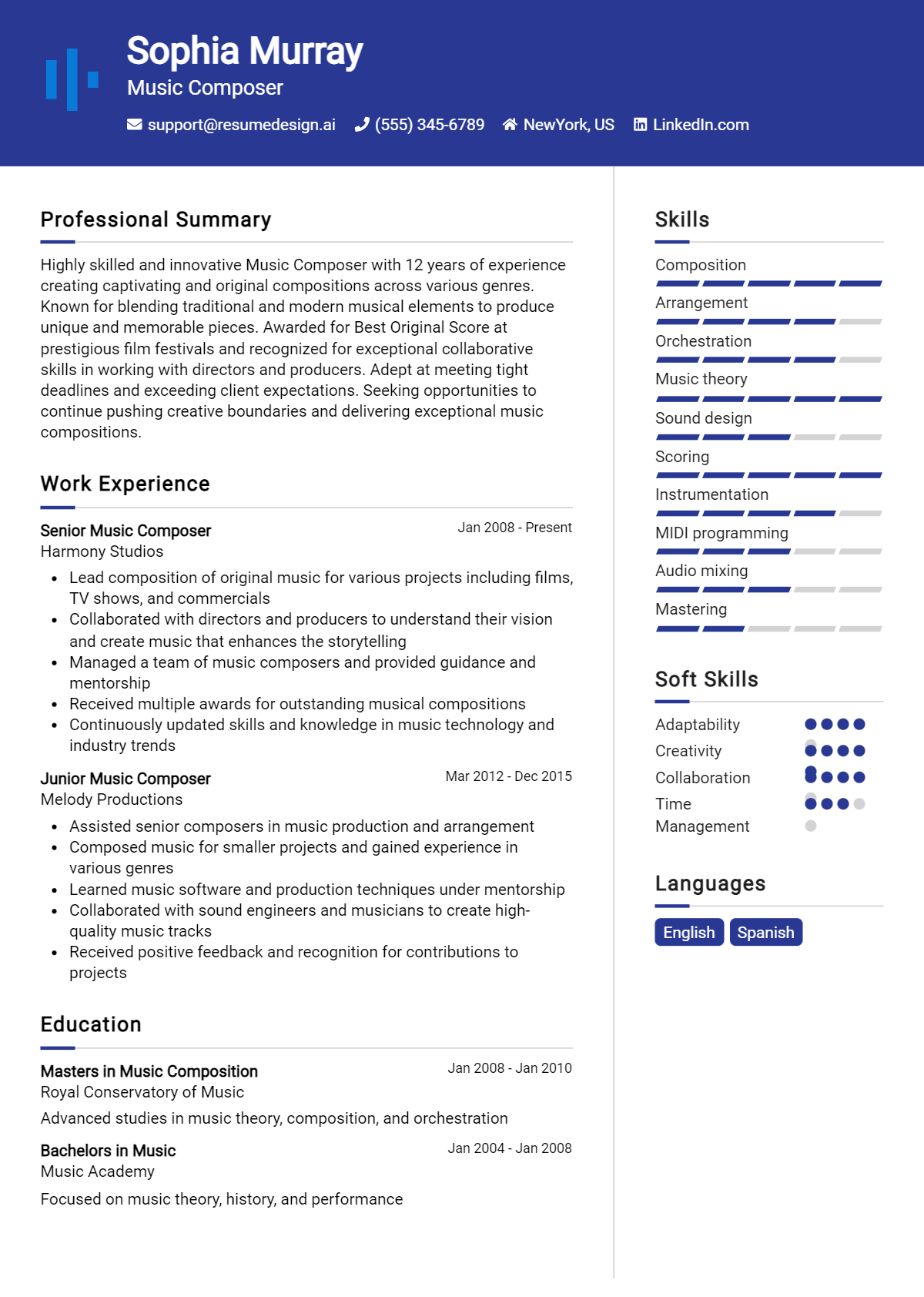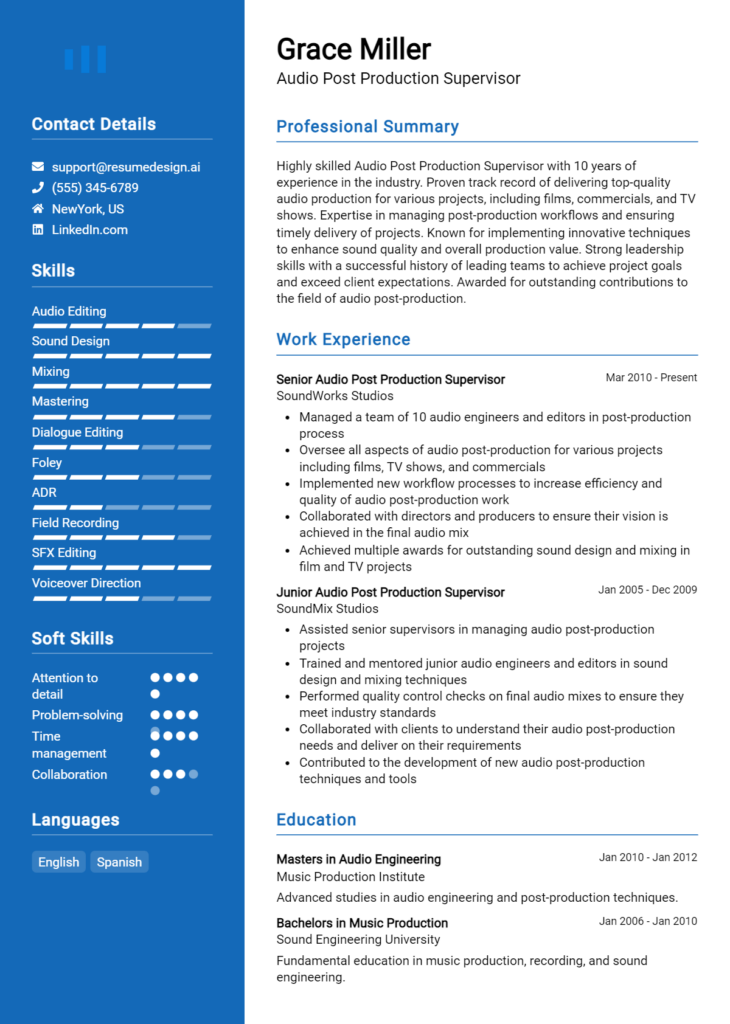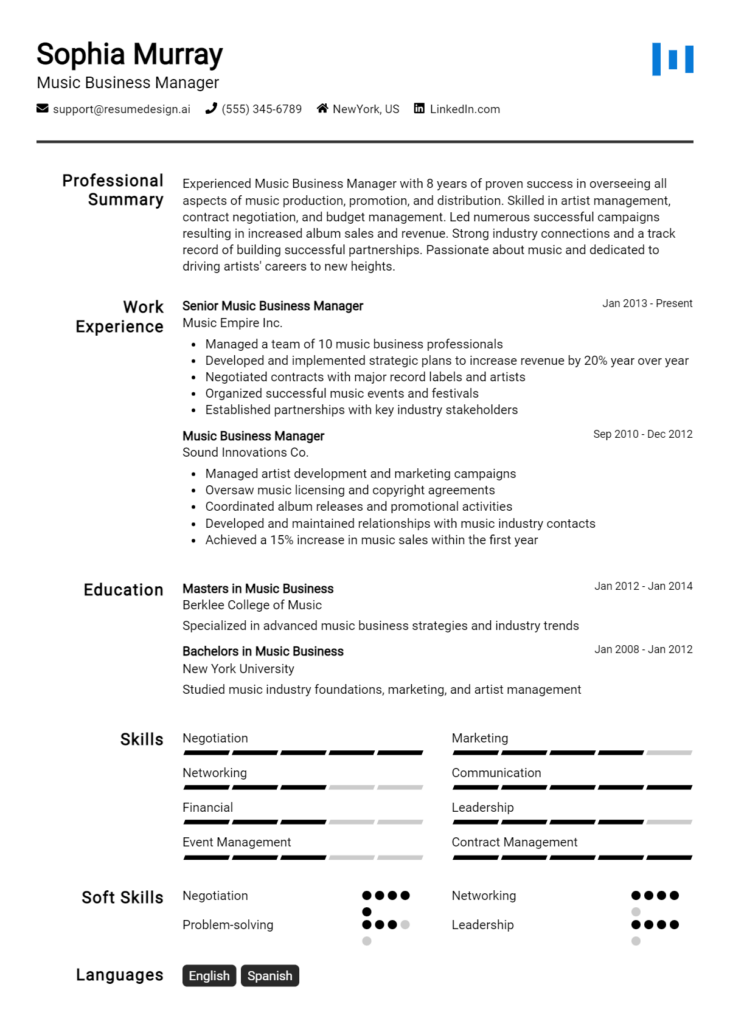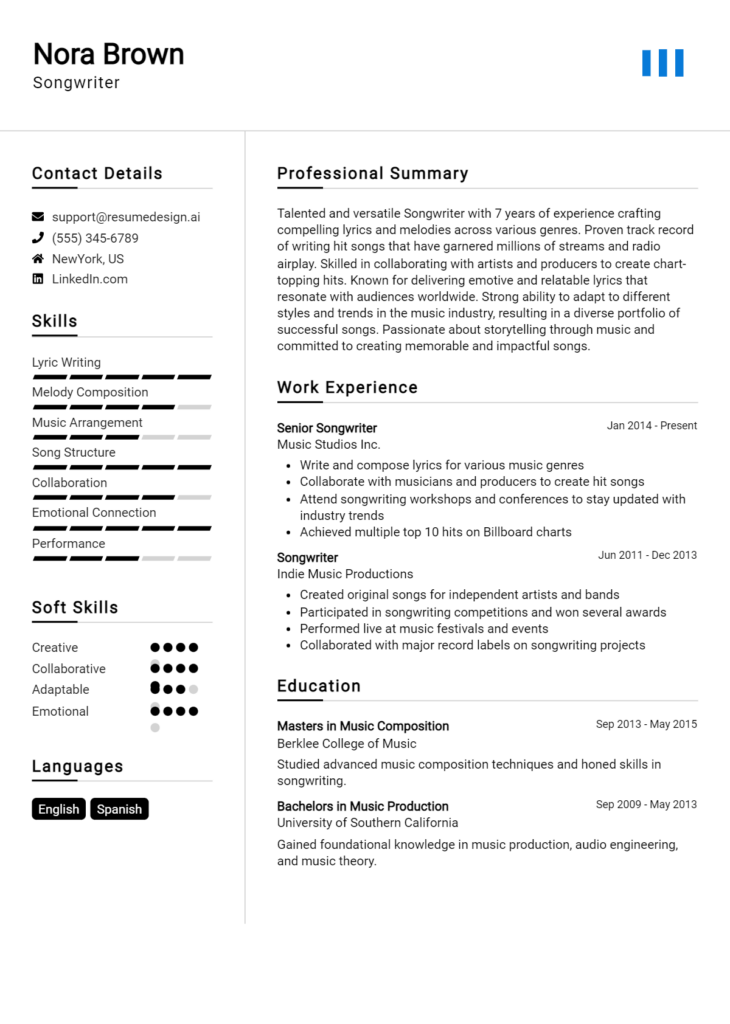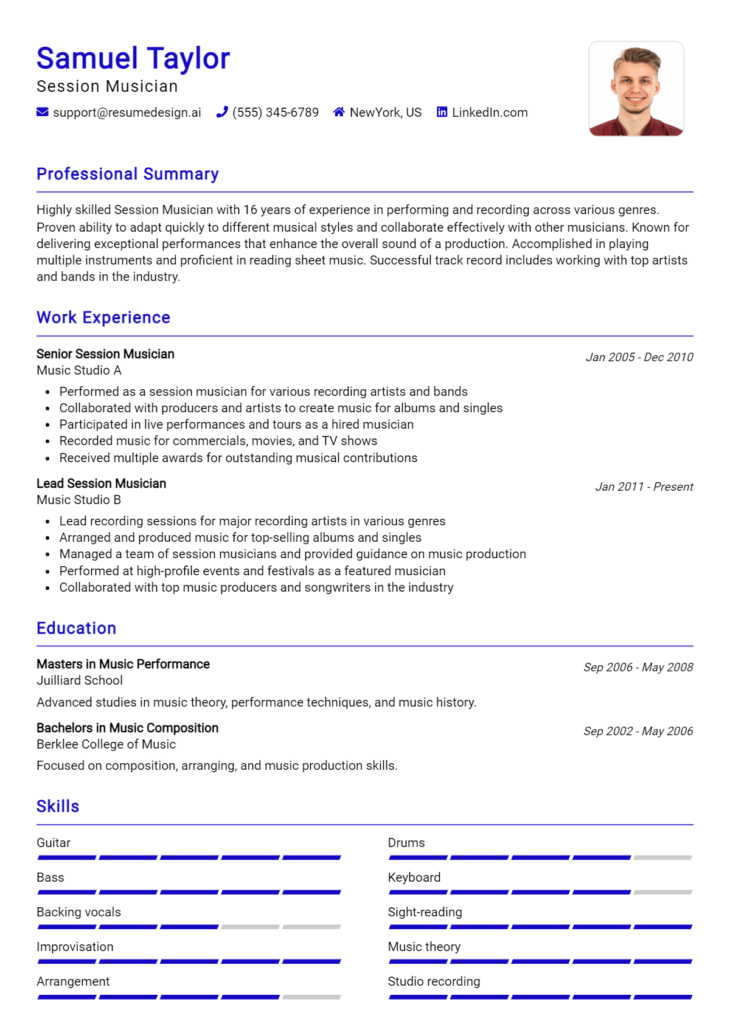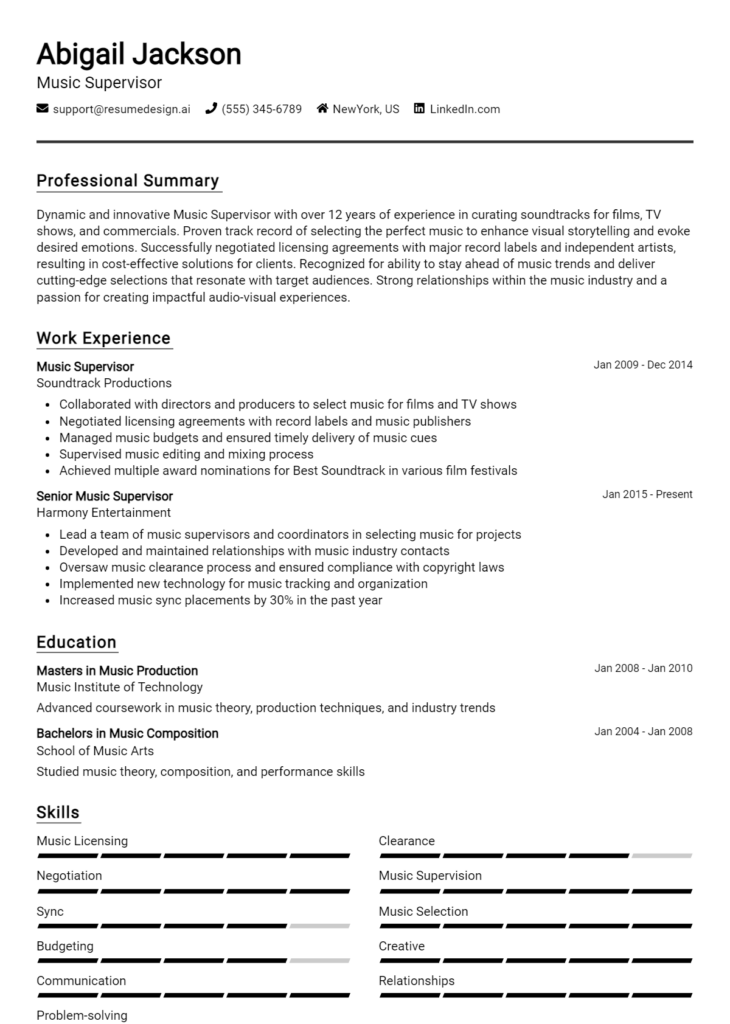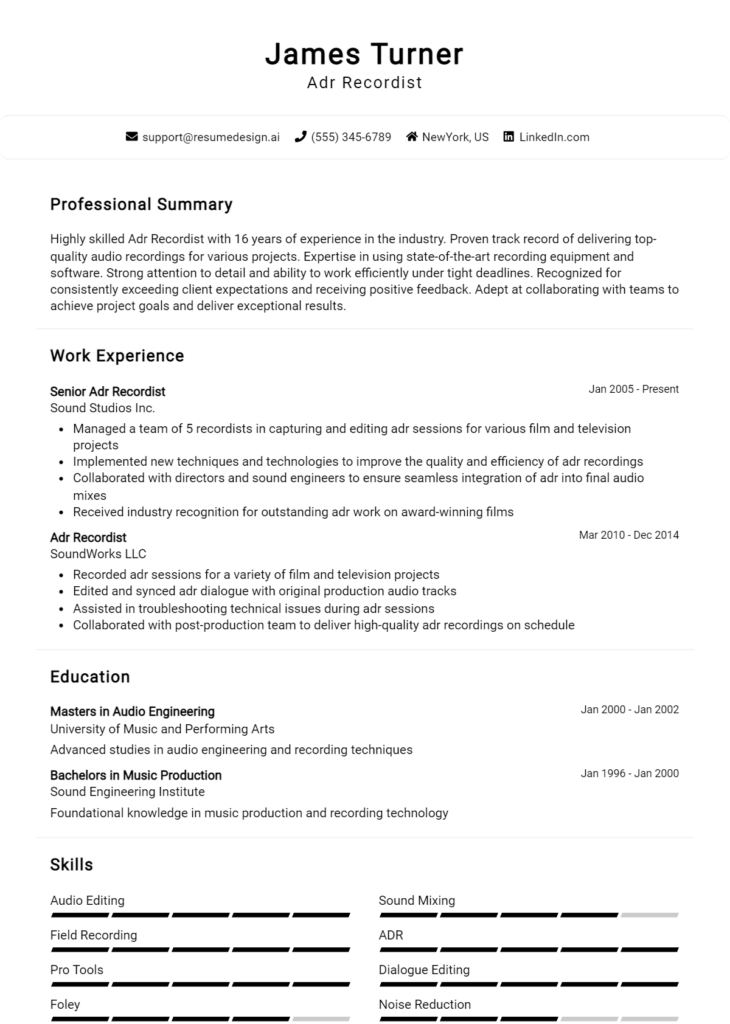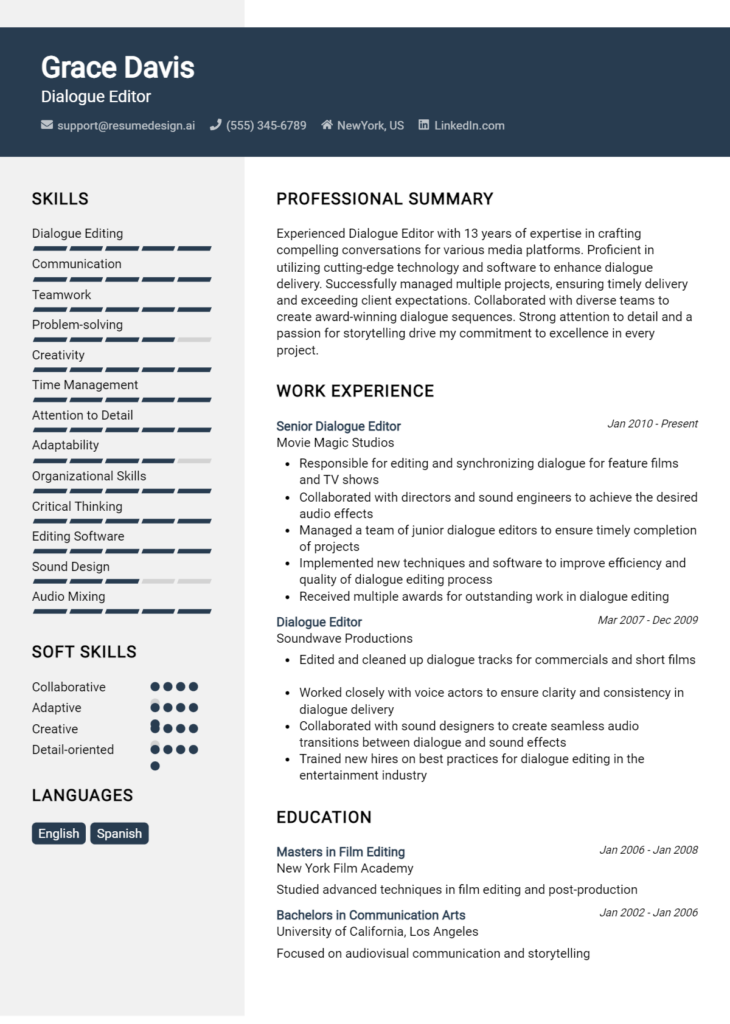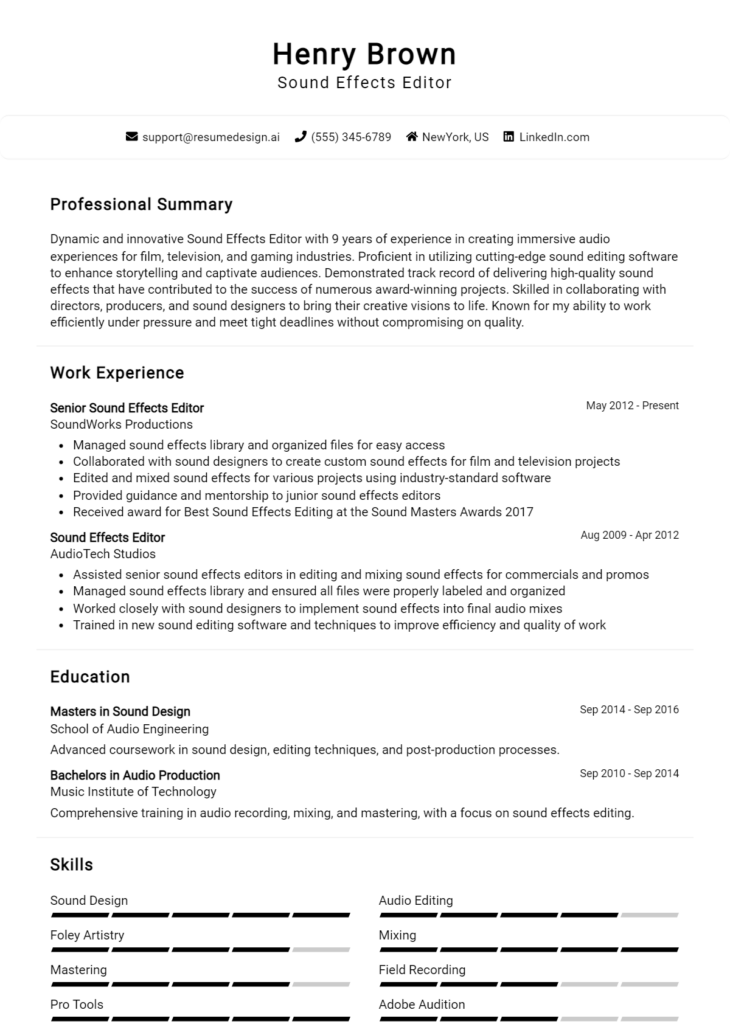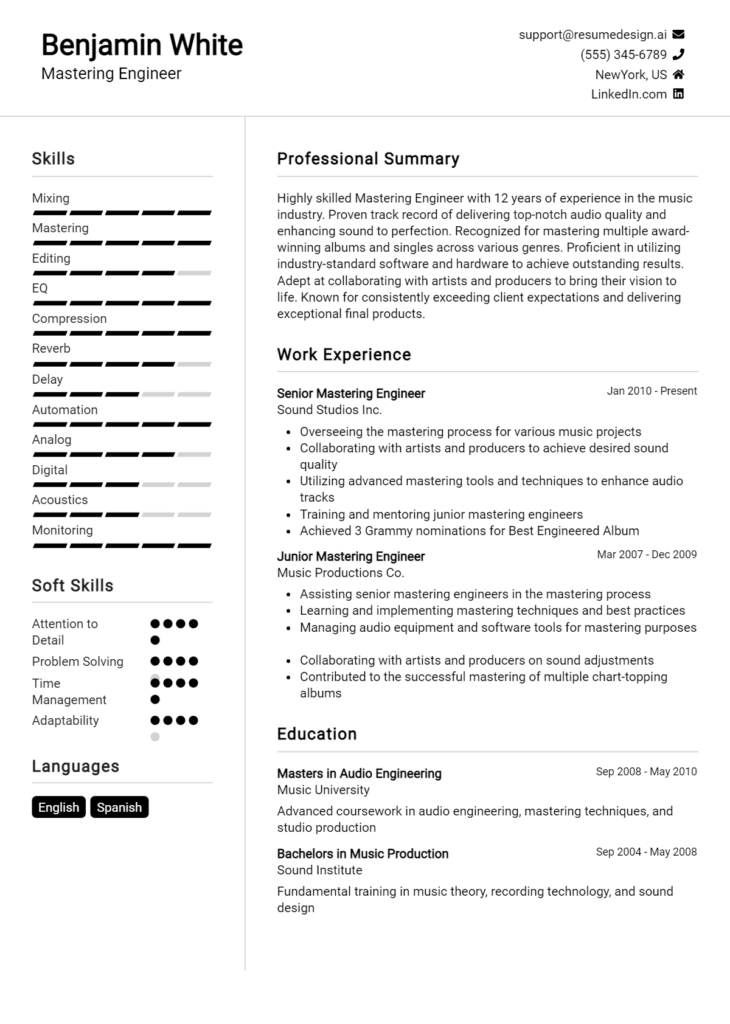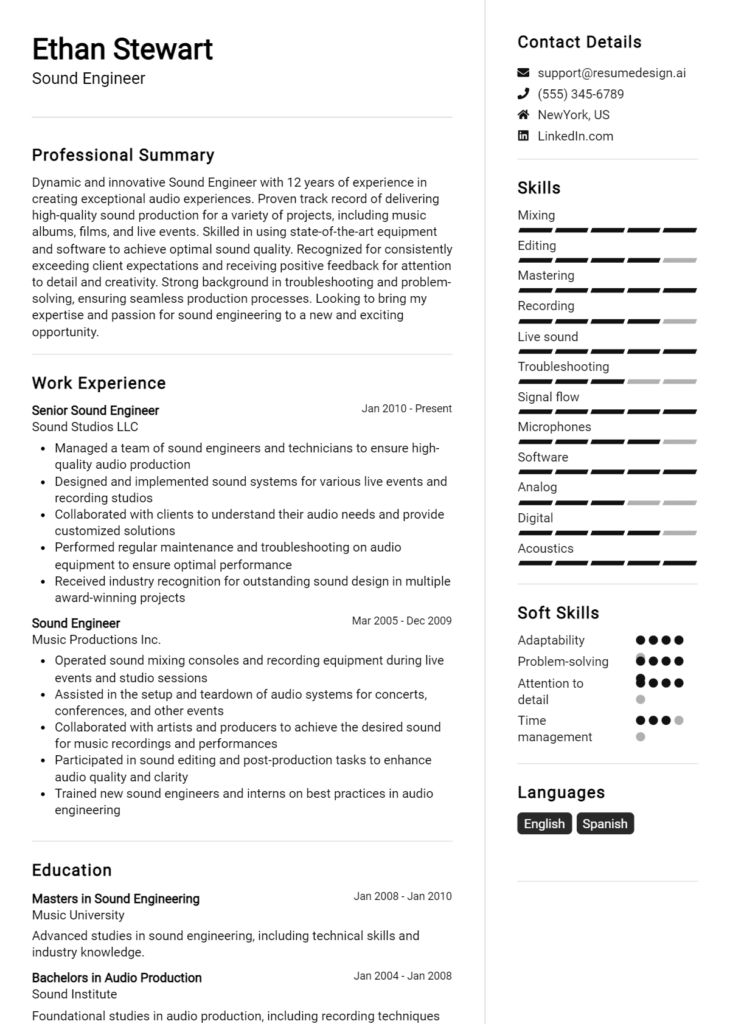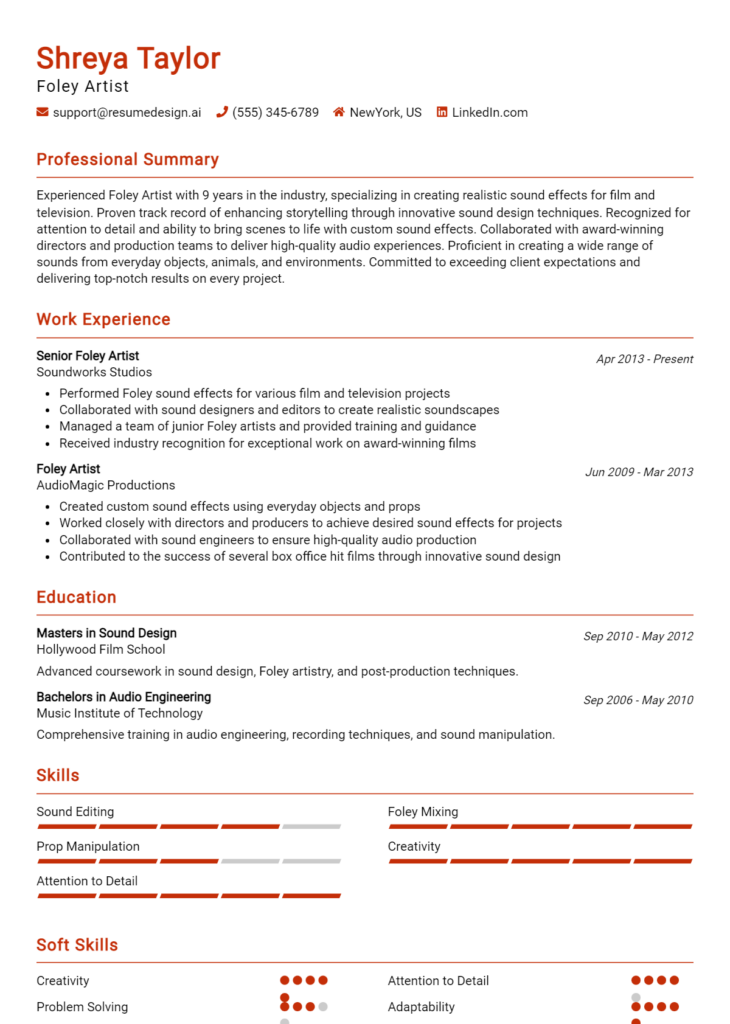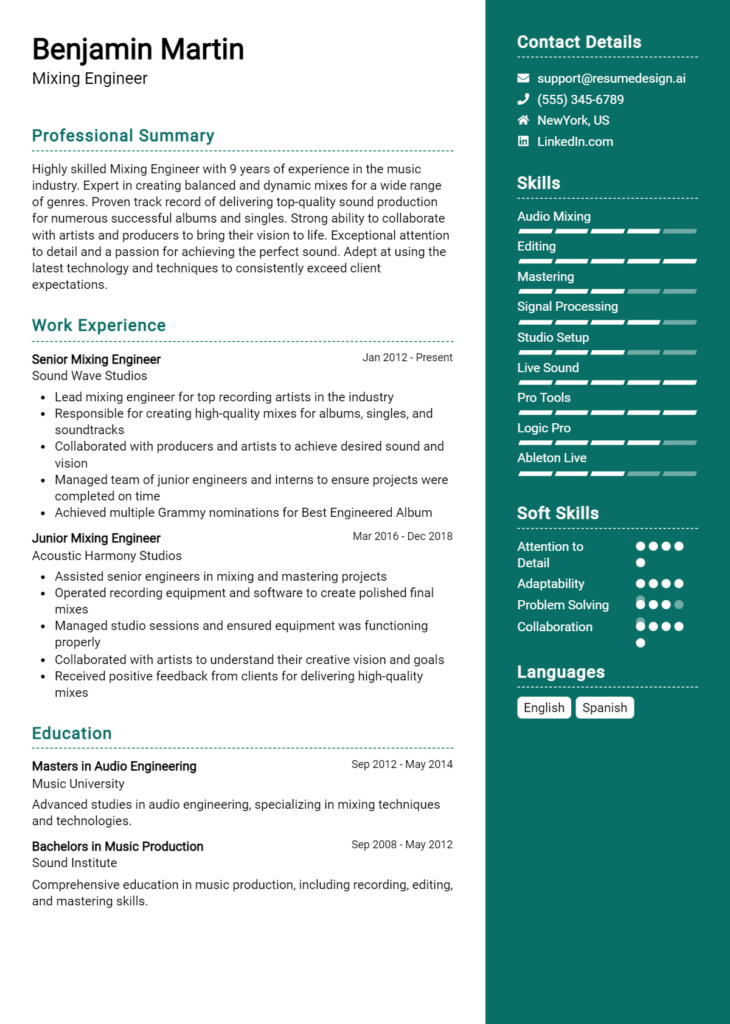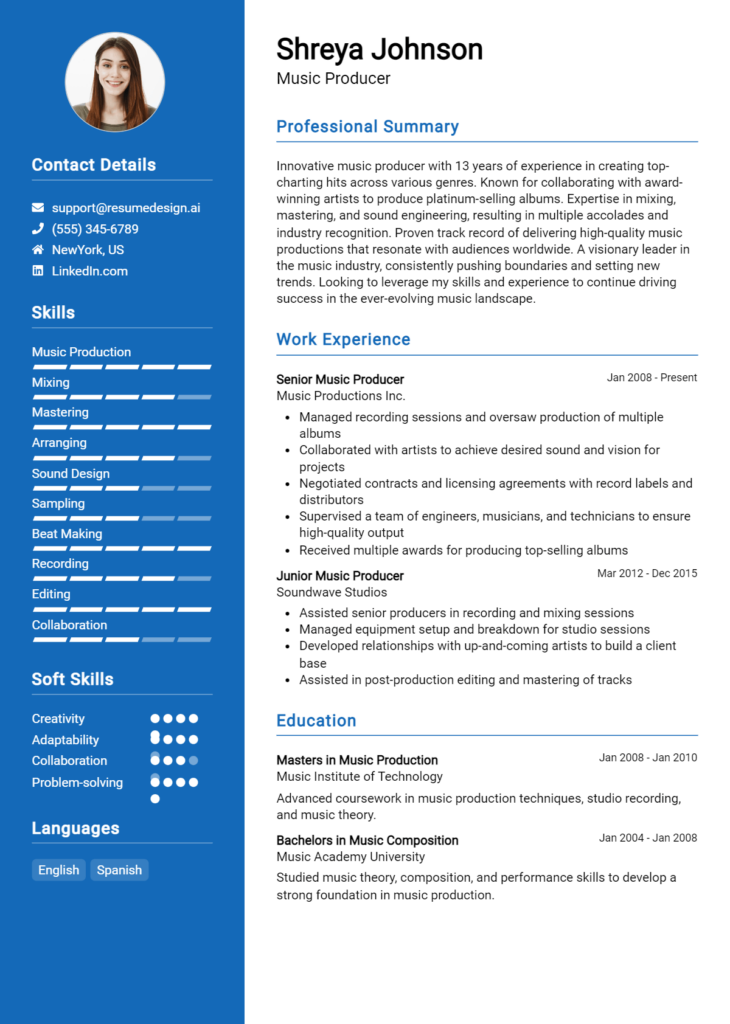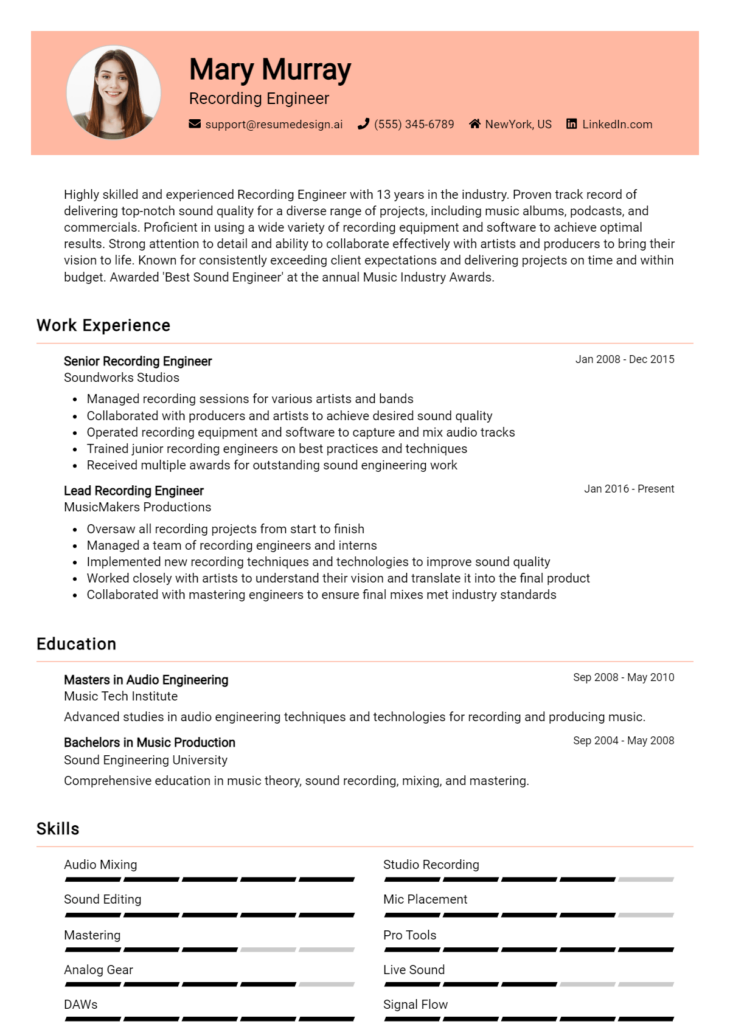Music Composer Core Responsibilities
A Music Composer is responsible for creating original music scores that enhance visual media, such as films, television shows, and video games. This role requires a blend of technical skills in music production and an understanding of storytelling, necessitating collaboration with directors, producers, and sound engineers. Strong problem-solving abilities and operational expertise are crucial for adapting compositions to suit various artistic visions. A well-structured resume highlighting these qualifications can significantly contribute to an organization's creative goals.
Common Responsibilities Listed on Music Composer Resume
- Compose original music for film, television, and other media.
- Collaborate with directors and producers to understand project requirements.
- Arrange and orchestrate musical scores for diverse ensembles.
- Record and produce music tracks using digital audio workstations.
- Conduct music rehearsals and oversee recording sessions.
- Edit and refine compositions based on feedback from stakeholders.
- Stay updated on industry trends and new music technologies.
- Manage and maintain a library of original compositions.
- Work within budgets and timelines to deliver music projects.
- Network with other industry professionals for collaboration opportunities.
- Promote and market original music to potential clients.
High-Level Resume Tips for Music Composer Professionals
In the competitive world of music composition, a well-crafted resume is crucial for making a lasting first impression on potential employers. Your resume serves as a gateway to showcasing your unique talents, skills, and accomplishments, and it needs to effectively reflect your artistic vision and professional experience. A compelling resume not only highlights your qualifications but also tells your story as a music composer, setting you apart in a crowded field. This guide will provide practical and actionable resume tips specifically tailored for Music Composer professionals, helping you create a document that resonates with hiring managers and reflects your musical journey.
Top Resume Tips for Music Composer Professionals
- Tailor your resume for each job application by carefully reading the job description and aligning your skills and experiences with the specific requirements.
- Highlight relevant experiences, such as film scores, commercial jingles, or concert performances, to show your versatility and adaptability in different musical genres.
- Quantify your achievements whenever possible, such as the number of projects completed, audience size, or awards received, to provide concrete evidence of your successes.
- Include a dedicated section for your technical skills, such as proficiency in music software like Logic Pro, Ableton Live, or Sibelius, as these are essential in the industry.
- Showcase any collaborations with notable artists or productions, as this can enhance your credibility and demonstrate your network within the music community.
- Incorporate links to your portfolio or samples of your work, such as soundtracks or compositions, to give employers a firsthand look at your style and capabilities.
- Use a clean and visually appealing layout with clear headings and sections to make your resume easy to read and navigate.
- Keep your resume concise, ideally one page, while ensuring that all relevant information is included without overwhelming the reader.
- Consider adding a brief personal statement or summary that encapsulates your musical philosophy and career goals, making it easier for employers to connect with you.
By implementing these tips, you can significantly increase your chances of landing a job in the Music Composer field. A polished and tailored resume not only highlights your unique skills and achievements but also communicates your passion for music, making you a more appealing candidate to potential employers. Stand out from the competition and let your resume reflect the creative force behind your compositions.
Why Resume Headlines & Titles are Important for Music Composer
In the competitive field of music composition, a well-crafted resume headline or title is crucial for making a strong first impression. This brief yet powerful phrase serves as a snapshot of a candidate's key qualifications and creative identity, allowing hiring managers to quickly assess their fit for a role. A strong headline not only captures attention but also encapsulates the essence of the composer's expertise, signaling their unique skills and experiences in a concise manner. By aligning the headline with the specific job being applied for, candidates can effectively position themselves as ideal matches for prospective employers.
Best Practices for Crafting Resume Headlines for Music Composer
- Keep it concise; aim for one impactful phrase.
- Make it role-specific, highlighting relevant skills and experiences.
- Use strong action verbs to convey your accomplishments.
- Incorporate keywords from the job description to improve relevance.
- Showcase your unique selling points, such as awards or notable projects.
- Avoid generic phrases; be distinct and memorable.
- Consider your target audience and tailor your headline accordingly.
- Ensure it reflects your personal brand as a composer.
Example Resume Headlines for Music Composer
Strong Resume Headlines
Award-Winning Film Composer with 10+ Years of Experience in Orchestral Scoring
Innovative Music Composer Specializing in Electronic and Hybrid Genres
Versatile Composer and Arranger with a Proven Track Record in TV and Film Soundtracks
Weak Resume Headlines
Music Composer
Experienced Musician Seeking Opportunities
The strong headlines are effective because they provide specific information about the candidate's expertise, experience, and accomplishments, immediately conveying their value to potential employers. They are tailored to the role and incorporate elements that resonate with hiring managers. In contrast, the weak headlines fail to impress due to their vagueness and lack of distinctiveness, leaving hiring managers unsure of the candidate's qualifications and making them forgettable in a sea of applicants.
Writing an Exceptional Music Composer Resume Summary
A resume summary is a crucial component for a Music Composer as it serves as the first impression to hiring managers. A well-crafted summary quickly captures attention and showcases key skills, relevant experience, and notable accomplishments that align with the job role. It should be concise yet impactful, providing a snapshot of the candidate's unique qualifications tailored specifically to the position they are applying for. By effectively summarizing the candidate's strengths, the resume summary can pave the way for further consideration in the hiring process.
Best Practices for Writing a Music Composer Resume Summary
- Quantify achievements: Use numbers to highlight the impact of your work, such as the number of projects completed or audience size.
- Focus on relevant skills: Emphasize technical skills like composition software proficiency, orchestration, and music theory knowledge.
- Tailor the summary: Customize the summary for each job application to reflect the specific requirements and keywords from the job description.
- Highlight notable collaborations: Mention any partnerships with recognized artists, producers, or organizations to enhance credibility.
- Include genres of expertise: Specify the musical styles or genres you excel in to attract attention from employers looking for specific talents.
- Showcase awards or recognitions: Mention any accolades or accomplishments that distinguish you from other candidates.
- Keep it concise: Aim for 3-4 sentences that succinctly summarize your qualifications without overwhelming the reader.
- Use active language: Write assertively to convey confidence and clarity about your abilities and experiences.
Example Music Composer Resume Summaries
Strong Resume Summaries
Dynamic Music Composer with over 10 years of experience creating original scores for film and television. Successfully composed music for over 30 projects, leading to a 25% increase in viewer engagement. Proficient in Logic Pro and Ableton Live, specializing in orchestral and electronic music.
Award-winning Music Composer recognized for innovative sound design and emotional storytelling through music. Collaborated with top-tier directors, contributing to three films that collectively grossed over $50 million. Expertise in blending contemporary styles with classical elements.
Versatile Music Composer with a passion for crafting memorable melodies across various genres, including pop, jazz, and classical. Delivered over 100 original pieces for commercials and corporate videos, resulting in a 40% uptick in brand recognition. Adept at meeting tight deadlines and adapting to client feedback.
Weak Resume Summaries
Music Composer with some experience creating music for different projects. I enjoy working with a variety of musical styles and hope to find a good opportunity.
Talented individual looking for a role in music composition. I have a passion for music and have worked on several projects without any specific details or metrics.
The examples provided illustrate the differences between strong and weak resume summaries. The strong summaries effectively quantify achievements, highlight relevant skills, and showcase specific experiences that directly relate to the job role. In contrast, the weak summaries lack detail and depth, failing to convey measurable outcomes or unique qualifications, making them less compelling to potential employers.
Work Experience Section for Music Composer Resume
The work experience section of a Music Composer resume is critical in demonstrating the candidate's depth of knowledge, technical skills, and ability to produce high-quality musical compositions. This section not only highlights the composer’s proficiency with various musical instruments and software but also emphasizes their capability to manage projects and collaborate with diverse teams. By quantifying achievements and aligning experiences with industry standards, candidates can effectively showcase their contributions and the impact of their work in the competitive field of music composition.
Best Practices for Music Composer Work Experience
- Highlight specific technical skills relevant to music composition, such as proficiency in digital audio workstations (DAWs) and notation software.
- Quantify achievements, such as the number of tracks produced, audience reach, or revenue generated from music sales.
- Emphasize collaboration with other musicians, producers, and directors to illustrate teamwork and communication skills.
- Detail your role in projects, specifying whether you were a lead composer, arranger, or sound designer.
- Include references to recognizable brands, artists, or projects to demonstrate credibility and industry experience.
- Showcase any awards or recognitions received for your compositions to validate your expertise.
- Utilize action verbs to convey your contributions effectively, such as "composed," "produced," or "orchestrated."
- Tailor your experience to align with the specific requirements of the job you are applying for, highlighting relevant projects.
Example Work Experiences for Music Composer
Strong Experiences
- Composed and produced a 12-track album for an indie artist, which generated over 100,000 streams on Spotify within the first month of release.
- Led a team of five musicians in scoring an original soundtrack for a feature film, resulting in a nomination for Best Original Score at the XYZ Film Festival.
- Collaborated with renowned director Jane Doe on a theatrical production, enhancing audience engagement by 30% through innovative sound design.
- Worked on a commercial project for ABC Brand, creating jingles that increased brand recognition by 25% as reported in post-campaign analysis.
Weak Experiences
- Worked on various music projects.
- Assisted in creating music for an event.
- Composed some songs for different artists.
- Involved in music composition occasionally.
The examples provided illustrate a clear distinction between strong and weak experiences. Strong experiences are characterized by quantifiable outcomes, specific roles, and impactful collaborations, demonstrating the candidate's value and expertise. In contrast, weak experiences lack detail, specificity, and measurable achievements, making them less compelling to potential employers. By focusing on strong experiences, candidates can effectively convey their capabilities and contributions in the music composition field.
Education and Certifications Section for Music Composer Resume
The education and certifications section of a Music Composer resume is vital for showcasing a candidate's academic achievements and industry qualifications. This section not only highlights the formal training and knowledge acquired through educational institutions but also demonstrates the candidate's commitment to continuous learning and professional development. By including relevant coursework, specialized certifications, and any additional training, candidates can significantly enhance their credibility and illustrate their alignment with the specific demands of the music composition field. This information serves to assure potential employers of the applicant’s preparedness and expertise in music composition, arrangement, and production.
Best Practices for Music Composer Education and Certifications
- Focus on relevant degrees, such as a Bachelor’s or Master’s in Music Composition, Music Production, or a related field.
- Include any industry-recognized certifications that demonstrate proficiency in composition software or music theory.
- Detail relevant coursework that aligns with the job role, like orchestration, scoring for film, or music technology.
- Highlight specialized training programs or workshops attended, especially those led by industry professionals.
- Keep the section concise and relevant, avoiding overly lengthy descriptions of unrelated educational experiences.
- Use a clear and organized format to enhance readability, making it easy for hiring managers to find key information.
- Update the section regularly to ensure all qualifications reflect the most current industry standards and practices.
- Consider including honors or awards received during your education that underscore your talent and dedication.
Example Education and Certifications for Music Composer
Strong Examples
- Bachelor of Music in Composition, Berklee College of Music, 2020
- Certification in Film Scoring, UCLA Extension, 2021
- Advanced coursework in Digital Music Production, Full Sail University, 2022
- Completed workshop on Orchestration Techniques with renowned composer John Williams, 2023
Weak Examples
- High School Diploma, Springfield High School, 2015
- Certification in Basic Guitar Playing, Local Community Center, 2018
- Course in Music Appreciation, Online Learning Platform, 2019
- Attended a one-day seminar on Music History, 2020
The strong examples listed demonstrate relevant degrees and certifications that are directly applicable to the music composition role. They highlight specialized training and advanced coursework that align with industry standards, showcasing the candidate's preparedness for professional opportunities. Conversely, the weak examples reflect outdated or irrelevant qualifications that do not significantly contribute to the candidate's profile as a Music Composer. These examples lack specificity and do not align with the skills and knowledge required for the role, which can detract from the candidate's overall credibility.
Top Skills & Keywords for Music Composer Resume
As a music composer, possessing the right skills is crucial not only for creating compelling musical pieces but also for standing out in a competitive industry. A well-crafted resume that highlights both your hard and soft skills can significantly impact your chances of landing desirable projects or positions. Employers in the music field often look for a combination of technical abilities and interpersonal qualities, ensuring that a composer can not only produce great music but also collaborate effectively with others. By showcasing your skills in your resume, you present a comprehensive picture of your capabilities, which can lead to more opportunities and successful collaborations. For more insights on essential skills, check out this skills resource.
Top Hard & Soft Skills for Music Composer
Soft Skills
- Creativity
- Collaboration
- Communication
- Adaptability
- Time Management
- Attention to Detail
- Problem-Solving
- Emotional Intelligence
- Open-mindedness
- Networking
Hard Skills
- Music Theory
- Proficiency in Music Software (e.g., Logic Pro, Ableton Live)
- Score Writing and Arrangement
- Audio Editing
- Orchestration
- Knowledge of Music Genres
- Sound Design
- MIDI Programming
- Recording Techniques
- Live Performance Experience
For guidance on how to effectively present your work experience in your resume, consider focusing on specific projects, collaborations, or notable performances that reflect your skills and expertise.
Stand Out with a Winning Music Composer Cover Letter
Dear [Hiring Manager's Name],
I am writing to express my interest in the Music Composer position at [Company/Organization Name]. With over [X years] of experience in composing original scores across various genres, I have honed my ability to craft music that not only complements visual media but also evokes powerful emotions in the audience. My background in both classical training and contemporary music production equips me with a versatile skill set that I believe would be an asset to your team.
Throughout my career, I have had the privilege of working on a diverse range of projects, from film soundtracks and video game scores to commercial jingles and theatrical productions. My recent project involved scoring an indie film that premiered at [Film Festival Name], where my work was praised for its ability to enhance the storytelling and character development. I am adept at collaborating with directors, producers, and sound designers to ensure that the music aligns seamlessly with the project’s vision and enhances the overall narrative.
In addition to my creative skills, I am proficient in various music production software, including [specific software names], which allows me to efficiently produce high-quality recordings. I thrive in dynamic environments and am always eager to experiment with new sounds and techniques, pushing the boundaries of traditional composition. I am excited about the opportunity to bring my unique style and passion for music to [Company/Organization Name], contributing to projects that resonate with audiences around the world.
Thank you for considering my application. I look forward to the possibility of discussing how my experience and vision can align with the innovative work being done at [Company/Organization Name]. I am eager to contribute to your team and help create memorable musical experiences that inspire and captivate.
Sincerely,
[Your Name]
[Your Contact Information]
[Your LinkedIn Profile or Portfolio Link]
Common Mistakes to Avoid in a Music Composer Resume
Crafting a compelling resume as a music composer is crucial for standing out in a competitive industry. However, many composers fall into common pitfalls that can undermine their chances of landing opportunities. Avoiding these mistakes can enhance your presentation and ensure that your resume effectively showcases your skills and experiences. Here are some common mistakes to be aware of:
Lack of Specificity: Failing to tailor your resume to specific roles or projects can make it seem generic. Highlight relevant skills and experiences that align with the job description.
Ignoring Formatting: A cluttered or overly complex layout can detract from the content. Use clear headings, bullet points, and consistent formatting to ensure easy readability.
Omitting Important Details: Neglecting to include key information such as your education, relevant software proficiency, or notable collaborations can leave potential employers in the dark.
Overloading with Technical Jargon: While it's essential to demonstrate your expertise, excessive jargon can alienate those who may not be familiar with specific terms. Aim for a balance between professionalism and accessibility.
Neglecting Online Presence: In today’s digital age, not including links to your website, social media profiles, or online portfolios can limit opportunities for employers to explore your work further.
Listing Irrelevant Experience: Including jobs or experiences that don’t relate to music composition can dilute your resume. Focus on experiences that showcase your relevant skills and achievements.
Failure to Showcase Achievements: Simply listing job duties without highlighting specific accomplishments can make your resume less impactful. Use quantifiable results or notable projects to illustrate your success.
Typos and Grammatical Errors: Even minor mistakes can convey a lack of professionalism. Always proofread your resume multiple times and consider having someone else review it for clarity and accuracy.
Conclusion
As a Music Composer, your resume is a vital tool in showcasing your creativity, skills, and experience. Throughout this article, we've explored the essential elements that should be included in your resume, such as highlighting your musical education, detailing your experience with various genres, and emphasizing your collaborative projects with other artists. Additionally, including any software proficiency, such as DAWs (Digital Audio Workstations) or notation software, can give you an edge over the competition.
In a field as competitive as music composition, standing out is crucial. Ensure that your resume reflects not just your technical abilities but also your unique artistic voice. Tailoring your resume for each opportunity can significantly increase your chances of landing an interview.
Now is the perfect time to review and refine your Music Composer Resume. Utilize the various resources available to you, including resume templates, which can provide a solid foundation for your document. Consider using a resume builder for a user-friendly experience that allows you to customize your content easily. Additionally, you can draw inspiration from resume examples that showcase successful Music Composers. Don’t forget the importance of a strong introduction; a well-crafted cover letter template can help you convey your passion and suitability for the role.
Take action today—review your resume and make it the best representation of your musical talents!

